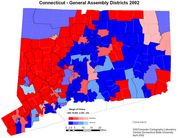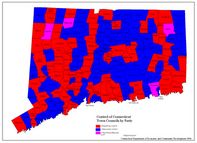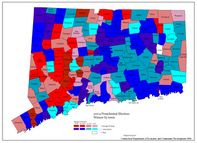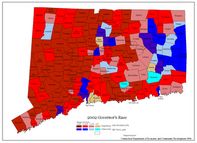The major points of the plan are as follows:
-The number of budget referenda will be increased from two to four.
-If the budget is not adopted by the fourth referendum, the previous year's budget automatically goes into effect, with an increase tied to the cost of living.
-The town meeting, at which the budget is amended and debated, will be eliminated.
As is the case whenever anyone tries to change things in Connecticut towns (especially the smaller ones), there is a lot of feet-dragging. Democratic Selectman Thomas Flood gives voice to the opposition's concerns:
"...The people of Portland are not going to set the tax rate. It’s going to be set by the CPI (the consumer price index)..."
What’s more, Flood said, the proposal would "do away with the town meeting, a staple of democratic government since the time of the Greeks. I just find this incomprehensible, that I can’t talk to my neighbors at a town meeting. It’s crazy!" (Mill)
Actually, the only thing that's wrong with this revision is the increase of budget referenda from two to four. Cut it to zero!
Budget referenda are a great idea in theory, very open and democratic. However, in practice, they simply don't work. Voter turnout is invariably abysmal, and invariably the only people who bother showing up to vote are cranky Taxpayer's Association types. A few years ago, the RHAM school district suffered through more than a dozen referenda before finally approving a horribly gutted budget. The Portland-sized town where I taught for a few years went through at least four before passing their budget. By the end of the long, drawn-out process, the only winners were the smug older people who came out to vote down referendum after referendum. The losers? Kids. The schools are always the focus of budget cuts, since so much of the budget goes to education.
The town meeting suffers from the same problems. Portland has 15,000 people. Do all of them show up? What would happen if they did? Obviously, they can't all show up to amend the budget; that's why they elect representatives to vote on and amend the budget for them.
The selectman/town meeting form of government is the most democratic in the country, but it only works in the smallest of communities, and only then if people participate. A council/manager form of government should be used for towns larger than 10,000 people.
Portland had actually veered in this direction for a glorious moment:
While Manning wanted a simplified process to adopt a budget, the majority of the charter commission ranged farther afield, calling for the elimination of the post of first selectman and replacing it with a director of administrative services, who would function as a town manager.
The commission also proposed eliminating the election of the town clerk, and opting instead for the clerk’s appointment.
Unfortunately, guys like Thomas Flood would have none of it:
Both proposals failed to garner any support from the selectmen, who had to review and approve the measures. (Mill)
Keep trying, Portland.
Sources:
Mill, Jeff. "Town Meeting Controversy". Middletown Press January 30th, 2005.
Seay, Gregory. "Budget Referendum Limit on the Ballot". Hartford Courant January 31st, 2005.




